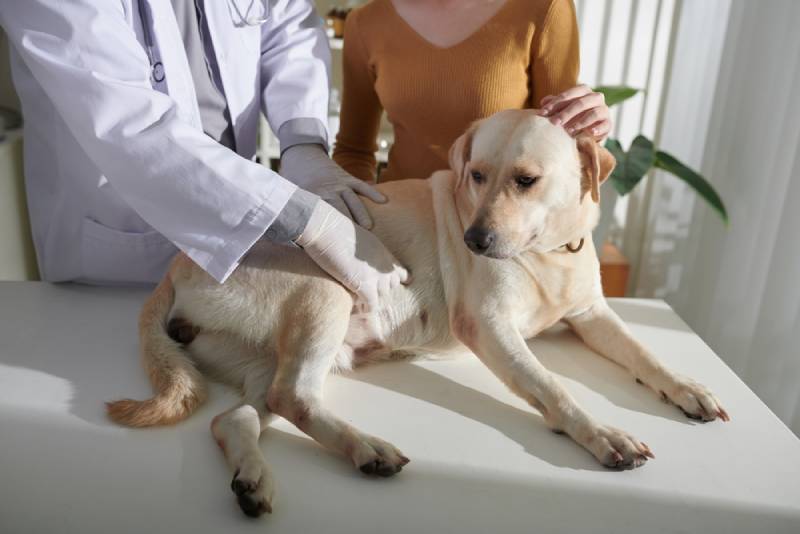Why Is My Maltese Shaking? Vet Approved Facts & FAQ
Updated on

The Maltese is a precious companion breed that is known for being loving, affectionate, gentle, and quite charming. Like any purebred dog, they may be predisposed to certain health conditions, including shaker syndrome. While there is no definitive evidence that shaker syndrome is an inherited genetic disorder, the Maltese is one of the breeds commonly affected.
Shaker syndrome is just one of the several underlying reasons why your dog may be shaking. So, if your Maltese has suddenly begun shaking, it is time to reach out to your vet to have them properly evaluated. To gain a better understanding of this unique health condition, keep reading.
What Is Shaker Syndrome?
Shaker syndrome is a condition involving uncontrollable tremors that occur without any known cause. Tremors refer to the involuntary, repetitive contraction of muscles in the body. Dogs with shaker syndrome may have tremors that range in severity from mild to severe.
Also referred to as generalized tremor syndrome and “Little White Shaker Syndrome,” this condition is most often seen in white, small-breed dogs including the Maltese, West Highland Terrier, Bichon Frise, and Toy Poodle.
The sudden onset of shaker syndrome often occurs between 6 months and 2 years of age. Though shaker syndrome is most common in white dogs that weigh less than 30 pounds, dogs of any coat color and age are susceptible.

What Are the Signs of Shaker Syndrome?
Signs of shaker syndrome may be more subtle at first, making it easy to mistake for shivering due to cold or even nervousness. The severity of the condition can vary but will often be worse when your dog is active, excited, or stressed.
The tremors can affect the head and entire body and may be accompanied by rapid eye movements. These muscle contractions may range from mild to paralyzing. Since tremors can also be a sign of other conditions of the nervous system, it is very important to seek veterinary care as soon as possible.
- Head and body tremors
- Shivering
- Lack of coordination
- Uncontrolled rapid eye movements
- Unusual gait
- Difficulty walking
- Paralysis
- Seizures
What Are the Causes of Shaker Syndrome?
Shaker syndrome is considered idiopathic, meaning it arises spontaneously under unknown causes. Several theories have been considered, but the evidence has yet to fully support a definitive root cause.
There is a possibility the condition is autoimmune, considering it responds to steroids. It is thought to be a condition of the central nervous system and while no hereditary links have been established, it is recommended that breeders do not breed affected dogs.
How Do I Care for a Maltese with Shaker Syndrome?
It’s important that if your Maltese is showing any signs of shaker syndrome, you take them to the veterinarian immediately. Not only is it important to get a proper diagnosis, in case it is something more serious, but you will want to treat the condition right away.

Diagnosis
The veterinarian will go over your dog’s medical history and complete a thorough physical exam that will include routine lab work including a blood chemical profile, a complete blood count, a urinalysis, and an electrolyte panel.
Since shaking can be associated with other health ailments like hypoglycemia, hypothermia, anxiety, and toxicity, these tests will allow them to rule out any other conditions that could be causing the tremors. In some cases, a sample of cerebrospinal fluid may be collected for a more thorough analysis of the nervous system.
Treatment
Treatment will depend on the severity of the condition and whether there are any other underlying medical conditions that also warrant treatment. In the most severe cases, hospitalization may be required until your dog is stabilized. In mild to moderate cases, treatment can be done at home.
The primary treatment for shaker syndrome is prescription corticosteroids, specifically prednisone, to reduce the inflammatory response within your dog’s body. Most will show signs of recovery within the first week of treatment, though in rare cases some may not recover fully.
Over time, the steroids will gradually be reduced to the lowest effective dose. There are some cases where long-term steroid use is required and will be monitored carefully by veterinary staff since steroids can have both short-term and long-term side effects.
If your dog’s condition is unable to be managed with steroids or the associated side effects become an issue, other immunosuppressive drugs may be prescribed including mycophenolate, leflunomide, or cytarabine.
Living and Management
The prognosis for shaker syndrome is excellent and for most dogs, the tremors will resolve within 1 to 2 weeks of consistent treatment and can often be controlled with low-dose prednisone. At-home care involves making sure your dog gets the appropriate dose of medication per your veterinarian’s instructions.
You will want to keep a close eye on your dog to ensure signs of the condition do not return. You will also want to be wary of signs of the side effects of steroid use. Your veterinarian will recommend regular follow-up visits to monitor your dog’s condition and address any side effects of medication.

Frequently Asked Questions (FAQs)
Why Is My Dog Shaking All of a Sudden?
Shaker syndrome is just one of many reasons for a sudden onset of shaking and trembling. Shaking can indicate a wide variety of health conditions and could be indicative of something very serious. Your dog could be shaking for several reasons including fear, stress, cold, low blood sugar, ingestion of a toxic substance, or even pain.
It is important to seek veterinary care right away so that your dog can be properly diagnosed and treated. Take note of any other signs of illness, if any, that are accompanying the shaking. This can include rapid eye movements, loss of balance, lack of coordination, vomiting, diarrhea, or anything else outside of the norm.
What Can I Do While My Dog Is Experiencing Tremors?
If your dog is suddenly experiencing tremors, call your veterinarian right away and make sure they are in a safe, secure area to prevent any falls or other injuries that could occur from their lack of muscle control. Since the condition can worsen with excitement, stress, or activity, you should make sure your dog’s surroundings are calm, quiet, and free from distractions.
If you have someone available to take a quick video of the shaking, this could be shown to your veterinarian during the examination to give them a better idea of what your dog is experiencing if the tremors have stopped by the time you arrive at the clinic.
Is Shaker Syndrome Painful?
Shaker syndrome is not a painful condition. Symptoms often become worse when exercising, under stress, or when your dog is excited, and will lessen or resolve with rest and sleep. The sudden onset of symptoms may start off as mild and worsen over a period of several days.
What Happens If My Dog Has a Seizure?
Seizures may occur in very rare cases with shaker syndrome. If your dog begins seizing, you want to prevent them from inadvertently injuring themselves. Keep your dog away from stairs or any furniture they could fall from, cushion the head, and gently hold and comfort them until the seizure stops. Call your veterinarian right away for further guidance.
Conclusion
If you Maltese has suddenly started shaking, it could be due to the condition known as shaker syndrome. This condition is common in other small breeds as well, including the West Highland Terrier, Bichon Frise, and Toy Poodle. Shaker syndrome is most common in white dogs. The prognosis for shaker syndrome is often good, but it’s important to reach out to your vet for diagnosis and proper treatment.
Featured Image Credit: F Grao, Shutterstock














